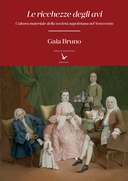Explore

According to Carlo Ginzburg, culture is not only the scholars’ knowledge, but it is also made of all the mixture of a population attitudes, beliefs and behaviours. In this sense, objects are one of the culture’s main expressions. Using materiality as a key, the volume analyses the history of the Neapolitan society during the Eighteenth century in some of its multiple articulations: aristocracy, law men, middle class, lower class. The idea of defining the strata of the ancien regime society is now considered unfeasible, partly because the criteria of definition and legitimation were multiple and different at the time: legal certifications, occupation, geographical origin, wealth. In this complicated universe, owning specific goods was part of the process of definition of the individual affiliation to a group, in terms of having a similar life style, as well as adopting the same ideals. The objects, inherited and annotated into inventories, useful to understand this phaenomenon, were not only precious dresses and jewels, but also iron spoons, lead cruxes, or glass beads. Despite their physical features, the value of these goods was not just economic; it stands also in the symbolic meaning they carried.
This book is included in DOAB.
Why read this book? Have your say.
You must be logged in to comment.
Rights Information
Are you the author or publisher of this work? If so, you can claim it as yours by registering as an Unglue.it rights holder.Downloads
This work has been downloaded 86 times via unglue.it ebook links.
- 86 - pdf (CC BY-NC-ND) at Unglue.it.
Keywords
- Eighteenth century
- History
- Humanities
- Inventories
- Material culture
- Naples
- Social history
- thema EDItEUR::N History and Archaeology::NH History
Links
DOI: 10.6093/978-88-6887-149-9Editions

